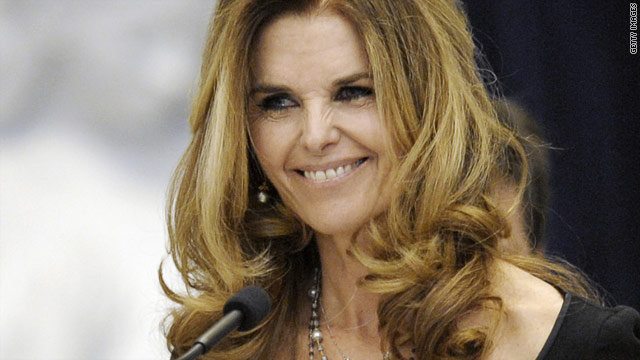(CNN) -- Maria Shriver's father, Sargent Shriver, died from Alzheimer's in January after being diagnosed in 2003. In her first public remarks about her father since his death, Shriver spoke to Larry King about his battle with the disease, her thoughts on Alzheimer's research and why the disease is especially hard on women. Her interview can be seen in its entirety on Sunday, May 1 at 8 p.m. ET on "A Larry King Special, Unthinkable: The Alzheimer's Epidemic."
After her father's diagnosis, Shriver became a vocal advocate for Alzheimer's patients, families and caretakers. She partnered with the Alzheimer's Association to publish a groundbreaking study called "Alzheimer's in America: The Shriver Report on Women and Alzheimer's," which was just released in paperback.
The Shriver report looked at Alzheimer's as a women's disease from the point of view of the patient, the family and the caregivers. Below is an excerpt of a letter introducing "The Shriver Report:"
"I'm Maria Shriver, and I'm a child of Alzheimer's."
That's how I introduced myself last year when I testified before the Senate Special Committee on Aging. I was there to support the Alzheimer's Study Group, a blue-ribbon panel Congress had charged, at the request of the Alzheimer's Association, with designing an action plan to deal with Alzheimer's disease.
Alzheimer's is an epidemic. Every minute or so -- in fact, before you get to the end of this page -- someone in this country will develop Alzheimer's. Millions of people already have been formally diagnosed. Millions more are undiagnosed -- or diagnosed with some form of dementia that could actually be Alzheimer's. And with the 78 million baby boomers now moving into their later years, the cost of Alzheimer's to American society is expected to be $20 trillion between now and the year 2050. That's right -- $20 trillion.
There's no doubt about it. We are in the midst of a national emergency, and we're woefully unprepared.
So there I was in that packed hearing room, sitting with Alzheimer's Study Group members -- former House Speaker Newt Gingrich, former Sen. Bob Kerrey, former Supreme Court Justice Sandra Day O'Connor (who left the High Court to care for her husband with Alzheimer's) and Larry Butcher, chairman of Alzheimer's Community Care in Florida (who would lose his wife months later to younger onset Alzheimer's). We were all there to ask this powerful congressional committee to listen up, pay attention, increase funding and take on Alzheimer's.
I must admit it was something of a surreal experience for me, because the truth is, for so many years it was my father, Sargent Shriver, who would be sitting in that chair, pleading with senators to listen up, pay attention and increase funding. My dad was the one who would go up to the Hill to testify for his beloved Peace Corps and for all the War On Poverty programs he started and fought for, including Head Start, Vista, Job Corps and Legal Services for the Poor. My father was legendary for the way he worked the Capitol. He knew every senator and congressman by name. He knew their careers, their interests, their politics and their soft spots. He was a brilliant, idealistic and optimistic public servant. My dad was sharp and witty, a walking encyclopedia -- his mind a beautifully tuned instrument that left people in awe and inspired.
That was then. Today he doesn't know I'm his daughter, and he doesn't even know my name. To be honest, it's still really difficult to wrap my own mind around that. But so goes the reality and the heartbreak of Alzheimer's. It's a mind-blowing disease -- not just for the people who get it, but for everyone around them. That's why I'm so passionate about defeating it.
My name is Suzette Armijo. I am the founding Chair of YAAA!, Young Advocates for the Alzheimer's Association, President of Metro Phoenix Senior Resources, and I took care of my Grandmother who first began showing symptoms of dementia in 2006 and lost the battle in 2012. My goal is to see a world without Alzheimer's disease and other dementias.
I'm just one person, just two hands, just one heart. I have everything to offer.
This blog brings together resources and stories for other young caregivers and families dealing with the effects of Alzheimer's and the many OTHER forms of dementia including Dementia with Lewy Bodies, Creutzfeldt-Jakob Disease, Frontal Lobe Dementia, Huntington’s Disease , Parkinson’s Disease, Mild Cognitive Impairment, Wernicke-Korsakoff Syndrome, Mixed Dementia, Normal Pressure Hydrocephalus, Pick’s Disease and Vascular Dementia.

No comments:
Post a Comment